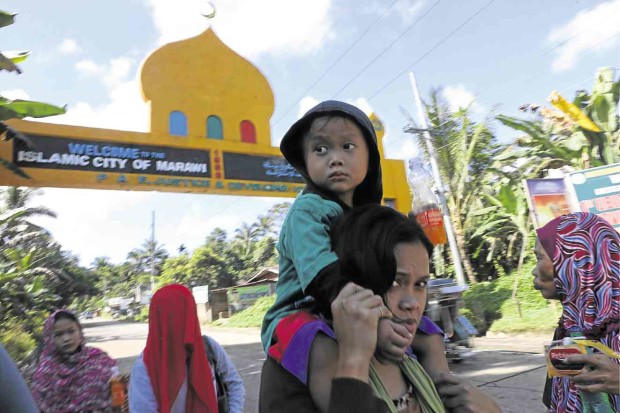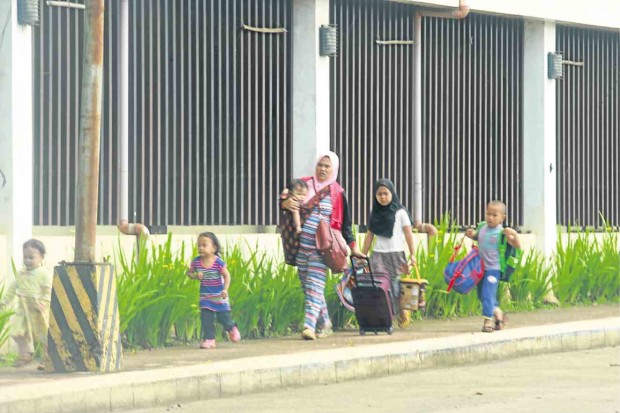Explosions, gunfire mar first day of Ramadan

LEAVING MARAWI. Terrified residents flee the city to escape the gunfight between government troops and the Maute group. —Jeoffrey Maitem
MARAWI — The deafening sound of exploding artillery shells and the occasional rapid fire from assault rifles drowned out the Islamic call to prayer called Adhan on Saturday for the Fajr—the dawn prayer.
About an hour earlier, Aminola Mitmug had just had Suhur, or the predawn meal, for the Ramadan, which came five days after troops and police launched deadly fighting against a combined force of Islamic State-linked Abu Sayyaf and Maute group fighters.
Some of the food he cooked for Suhur came from the relief pack—which consisted of canned goods and noodles—that the local government had given them a few days earlier.
What’s important, he said, was that he performed one of the main practices of Islam and that was to fast—whenever and wherever a Muslim could during Ramadan. In this case, it was inside a cramped evacuation camp inside the provincial capitol compound.
“On the first day of Ramadan, our main problems were water and electricity. But we need to sacrifice. As Muslims, we accept all the trials with patience and we don’t blame anyone for our situation today,” Mitmug told the Inquirer.
Article continues after this advertisementAbout a stone’s throw away from Mitmug’s tiny spot, Moshmerah Dipatuan, 44, cooked some of the food that her family managed to bring when they evacuated as the city came under heavy fire.
Article continues after this advertisementDipatuan said it was a painful Ramadan because aside from lack of food, her family’s home had been torched by rampaging gunmen.
“Our house was burned by Maute men. Now I heard officials are planning to transfer us to another evacuation center in Iligan City,” she said.
“It’s so painful because we do not feel the spirit of Ramadan. The fasting month here was normally festive, particularly at night,” Lanao del Sur Vice Gov. Mamintal Adiong Jr. said.
Adiong explained that Ramadan is the holiest month for Muslims and not observing it properly was more than just disheartening. For the devout, it would be a disaster to miss sawm, or fasting.

EXODUSOngoing clashes between government forces and the Maute terrorist group chase residents out of Marawi City on Friday. —Jeoffrey Maitem
It was during Ramadan when the first revelation of the Quran to Muhammad happened, according to Islamic beliefs.
“We should be happy but how can you celebrate with the current situation?” Adiong said.
Despite the situation, Muslims displaced by the fighting here continued to perform their religious obligations no matter how difficult it had become, Sambu Datu Dirampatan said.
What’s important, he said, was that they were still alive and able to fast.
“We have to make sacrifices,” he said.
The military has deployed bombers and helicopters for what it called “surgical airstrikes” meant to dislodge the enemy from hiding, and for ground troops to recover parts of Marawi still under terrorist control.
Muslim soldiers, who would otherwise be granted a Ramadan break, were also under instructions to continue with the fight. —WITH DJ YAP IN MANILA